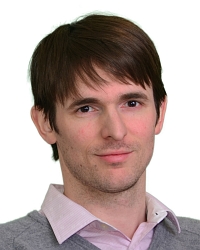TR2020-038
Learning to Separate Sounds From Weakly Labeled Scenes
-
- , "Learning to Separate Sounds From Weakly Labeled Scenes", IEEE International Conference on Acoustics, Speech, and Signal Processing (ICASSP), DOI: 10.1109/ICASSP40776.2020.9053055, April 2020, pp. 91-95.BibTeX TR2020-038 PDF Video Presentation
- @inproceedings{Pishdadian2020apr,
- author = {Pishdadian, Fatemeh and Wichern, Gordon and {Le Roux}, Jonathan},
- title = {{Learning to Separate Sounds From Weakly Labeled Scenes}},
- booktitle = {IEEE International Conference on Acoustics, Speech, and Signal Processing (ICASSP)},
- year = 2020,
- pages = {91--95},
- month = apr,
- publisher = {IEEE},
- doi = {10.1109/ICASSP40776.2020.9053055},
- issn = {2379-190X},
- isbn = {978-1-5090-6631-5},
- url = {https://www.merl.com/publications/TR2020-038}
- }
- , "Learning to Separate Sounds From Weakly Labeled Scenes", IEEE International Conference on Acoustics, Speech, and Signal Processing (ICASSP), DOI: 10.1109/ICASSP40776.2020.9053055, April 2020, pp. 91-95.
-
MERL Contacts:
-
Research Areas:
Abstract:
Deep learning models for monaural audio source separation are typically trained on large collections of isolated sources, which may not be available in domains such as environmental monitoring. We propose objective functions and network architectures that enable training a source separation system with weak labels. In contrast with strong time-frequency (TF) labels, weak labels only indicate the time periods where different sources are active in this scenario. We train a separator that outputs a TF mask for each type of sound event, using a classifier to pool label estimates across frequency. Our objective function requires the classifier applied to a separated source to output weak labels for the class corresponding to that source and zeros for all other classes. The objective function also enforces that the separated sources sum to the mixture. We benchmark performance using synthetic mixtures of overlapping sound events recorded in urban environments. Compared to training on mixtures and their isolated sources, our model still achieves significant SDR improvement.
Related News & Events
-
NEWS MERL presenting 13 papers and an industry talk at ICASSP 2020 Date: May 4, 2020 - May 8, 2020
Where: Virtual Barcelona
MERL Contacts: Petros T. Boufounos; Chiori Hori; Toshiaki Koike-Akino; Jonathan Le Roux; Dehong Liu; Yanting Ma; Hassan Mansour; Philip V. Orlik; Anthony Vetro; Pu (Perry) Wang; Gordon Wichern
Research Areas: Computational Sensing, Computer Vision, Machine Learning, Signal Processing, Speech & AudioBrief- MERL researchers are presenting 13 papers at the IEEE International Conference on Acoustics, Speech & Signal Processing (ICASSP), which is being held virtually from May 4-8, 2020. Petros Boufounos is also presenting a talk on the Computational Sensing Revolution in Array Processing (video) in ICASSP’s Industry Track, and Siheng Chen is co-organizing and chairing a special session on a Signal-Processing View of Graph Neural Networks.
Topics to be presented include recent advances in speech recognition, audio processing, scene understanding, computational sensing, array processing, and parameter estimation. Videos for all talks are available on MERL's YouTube channel, with corresponding links in the references below.
This year again, MERL is a sponsor of the conference and will be participating in the Student Job Fair; please join us to learn about our internship program and career opportunities.
ICASSP is the flagship conference of the IEEE Signal Processing Society, and the world's largest and most comprehensive technical conference focused on the research advances and latest technological development in signal and information processing. The event attracts more than 2000 participants each year. Originally planned to be held in Barcelona, Spain, ICASSP has moved to a fully virtual setting due to the COVID-19 crisis, with free registration for participants not covering a paper.
- MERL researchers are presenting 13 papers at the IEEE International Conference on Acoustics, Speech & Signal Processing (ICASSP), which is being held virtually from May 4-8, 2020. Petros Boufounos is also presenting a talk on the Computational Sensing Revolution in Array Processing (video) in ICASSP’s Industry Track, and Siheng Chen is co-organizing and chairing a special session on a Signal-Processing View of Graph Neural Networks.

